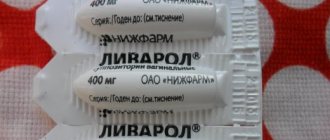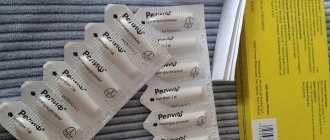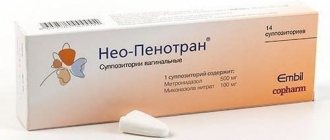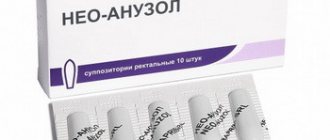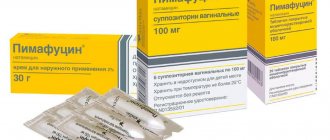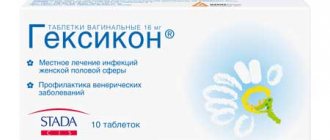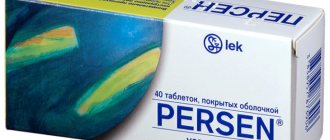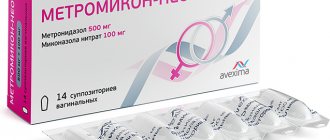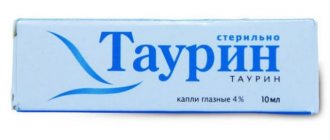Viferon suppositories are an antiviral drug prescribed by pediatricians for the prevention and treatment of various viral infections in children from the first days of life. It has few contraindications and its use is accompanied by side effects only in isolated cases.
Most often, children under one year old are prescribed Viferon 150,000 IU suppositories for colds and flu, and children aged 12 years and older are prescribed Viferon 500,000 IU. The difference between these drugs is only in the concentration of active components. The action is identical.
Release form
Viferon is a drug for rectal administration, which is available in the form of bullet-shaped suppositories. Their color can be either white or light yellow. The length of the candles does not exceed 3 cm, and the diameter is 10 mm. The active component is interferon alpha-2b.
As the instructions say, the candles also contain other auxiliary components:
- sodium ascorbate;
- disodium edetate dihydrate;
- ascorbic acid;
- polysorbate;
- a-tocopherol acetate.
To give the candles their shape and facilitate the process of inserting them into the rectum, confectionery fat and cocoa butter are also used in their manufacture. The drug is produced in a cardboard box, inside of which there is a blister with 10 separately packaged suppositories and instructions for use.
Overdose and interaction with other drugs
Viferon suppositories, ointments and gels have a wide range of indications. These include:
- Infections of the skin, mucous membranes and genitals caused by any type of herpes virus. Only ointment or gel is used.
- Acute upper respiratory tract infections caused by viruses (for example, ARVI).
- Infections complicated by the addition of bacterial flora.
- Chronic laryngotracheobronchitis.
- Intrauterine infections. It is used for chlamydia, herpes, persistence of cytomegalovirus and enterovirus infection. The list of indications also includes candidiasis and mycoplasmosis.
- Long-term hepatitis.
- Infectious and inflammatory diseases of the genitourinary system (chlamydia and cytomegalovirus infections, ureaplasmosis, trichomoniasis, etc.).
Viferon is not used as a monotherapeutic agent. The drug potentiates the effects of other drugs and helps reduce the amount of dangerous drugs taken during pregnancy.
Pharmacological actions
The active component of the drug is alpha-2b, which is a recombinant analogue of the human immune mediator - interferon, which has the following effects:
- antiviral;
- increasing immunity by enhancing the phagocytic activity of macrophages (immune cells);
- antiproliferative (suppresses excessive cell division in the area of inflammation);
- activation of specific cytotoxic activity of lymphocytes.
The presence of ascorbic acid in the drug increases the activity of interferon in the body and provides:
- antioxidant effect;
- membrane stabilizing effect;
- antipyretic effect;
- regeneration of damaged cells at the site of inflammation.
Absorption of the main active substance and auxiliary components into the blood occurs 10-15 minutes after the introduction of a rectal suppository into the rectum. They instantly react with cells of the immune system, penetrate their membrane, and begin their action. They suppress the replication (duplication) of DNA and RNA in which viruses are present, thereby preventing the disease from progressing.
In addition, the active substance enhances the activity of immune system cells, participating in the process of destruction by the virus inside infected cells and facilitating the removal of their breakdown products from the body. Alpha 2-d also normalizes the level of immunoglobulin E, preventing the occurrence of allergic reactions, and enhances the synthesis of secretory immunoglobulin A, which is responsible for the immunity of the lungs, reproductive system and gastrointestinal tract.
Viferon suppositories have a complex effect on the body - they suppress the reproduction of the virus, reduce intoxication of the body and help improve immunity. In addition, it enhances the therapeutic effect of other drugs, so it is often prescribed as an adjuvant therapy in the treatment of serious diseases.
Pharmacology
The main active component of suppositories is human interferon, which has a powerful immunostimulating and antiviral effect. Interferon, when released into the general bloodstream, stimulates the activation of the body's protective capabilities and the discrimination of cells of pathological agents of macrophages.
Thanks to ascorbic acid, the antiviral effect of the drug increases several times. Alpha-tocopherol acetate is a powerful antioxidant that helps protect the treated person's body from free radicals. This substance has a strong anti-inflammatory and regenerating effect.
Through interferon therapy, doctors are able to reduce the therapeutic doses of antibiotics or other drugs to be administered orally, as well as the duration of treatment. Due to this, in turn, the risk of liver damage and other serious complications in patients on long-term drug therapy is significantly reduced.
The existing cocoa butter suppositories make it possible to avoid the introduction of synthetic emulsifiers during the production process, which can negatively affect the body, causing severe poisoning.
Indications for use
Viferon 150000 suppositories are used in infants and children under 12 years of age as an adjuvant therapy in the treatment of the following diseases:
- ARVI;
- flu;
- tonsillitis (chronic tonsillitis);
- rotavirus infection;
- viral diseases (chickenpox, rubella, measles, Epstein Barr virus, etc.);
- bacterial infections in a complicated form, developing against the background of other respiratory diseases;
- meningitis of bacterial and viral origin;
- sepsis;
- diseases of the oral cavity that are infectious or inflammatory in nature (thrush, stomatitis, gingivitis, etc.);
- infections acquired during fetal development or during passage through the birth canal (ureaplasmosis, chlamydia, herpes, cytomegalovirus);
- hepatitis B, C, D and E;
- infectious and inflammatory diseases of the genital organs in infant girls and adult women during breastfeeding (gardenerellosis, vaginal vaginosis, candidiasis, etc.);
- infectious lesions of the skin and mucous membranes, occurring in a chronic form.
In addition, the use of Viferon suppositories is possible as an immunostimulating agent during pregnancy and in infants during teething. It is also often prescribed for the treatment of bacterial infections in conjunction with antibiotics (the drug enhances their effect) in adults and children over 12 months.
Use during pregnancy and breastfeeding
Ointment:
since when applied externally and locally, the systemic absorption of interferon is low and the drug has an effect only in the affected area, it is possible to use the drug Viferon (ointment) during pregnancy and breastfeeding.
Gel:
Since when applied topically, the systemic absorption of interferon is low and the drug has an effect only in the lesion, it is possible to use the drug Viferon (gel) during pregnancy and breastfeeding. During lactation, do not use the drug on the breast and nipple area due to the ability of the drug to form a long-lasting film on the surface of the skin.
Suppositories:
the drug is approved for use from the 14th week of pregnancy. There are no restrictions for use during lactation.
Directions for use and dosage
Viferon children's suppositories can be used only after prior consultation with a doctor. The dosage of the drug is selected individually and depends on the age of the child and the severity of the disease.
If a newborn has a high temperature during teething, it is recommended to insert 1 suppository into the rectum 2 times a day. If the drug is used as a complex therapy for infectious and inflammatory diseases accompanied by fever, runny nose, cough, etc., then it is recommended to administer suppositories according to the following scheme:
- children under one year old and premature infants whose gestational age exceeds 34 weeks - 1 suppository 2 times a day for 5-6 days;
- premature infants whose gestational age is less than 34 weeks - 1 suppository 3 times a day for 5-7 days.
The use of Viferon suppositories for the treatment of viral diseases that occur in a chronic form occurs as follows:
- For children under 6 months of age, 1 suppository is given 2-3 times a day;
- For children aged 6-12 months and older, 1 suppository is inserted into the rectum 3-4 times a day.
In all these cases, it is recommended to use Viferon suppositories with a concentration of the active substance of 150,000 IU. If they do not help and do not give the desired effect, 500,000 IU suppositories are used. However, in children such a high concentration of the active substance can cause an allergic reaction and a number of other side effects, so they should be used with caution. The minimum course of treatment with this drug is 5 days, the maximum is 10 days. The duration of treatment is determined by the attending physician. Before use, you need to check the expiration date of the suppository.
Mechanism of action
Treatment of pregnant women is a responsible and dangerous step. Infectious diseases in the mother require an integrated approach to the selection of effective and safe drugs with the participation of a therapist, infectious disease specialist and gynecologist. This is especially true for antiviral and antimicrobial agents. Most of them are contraindicated during pregnancy.
Among antiviral drugs, a group of interferons should be distinguished. Decades of use of interferon alpha-2b have shown its high activity against many viruses. However, parenteral interferons cannot be used during pregnancy due to the high risk of side effects. Among all interferons, the domestic drug VIFERON®, produced in the form of ointment, gel and suppositories, stands out.
The drug has antiviral, antiproliferative and immunomodulatory effects. Viferon helps restore immune reactions of all types in immunosuppressive pathologies (including those caused by persistent viral infection). The drug has antitoxic and antioxidant activity.
The content of ascorbic acid and vitamin E enhances the effect of interferon on the T- and B-link of immunity. The drug brings the concentration of immunoglobulin E (IgE) to normal levels and reduces the risk of developing allergic reactions. The drug has antibacterial, anti-inflammatory and regenerative effects by increasing the phagocytic activity of macrophages and the activity of cytotoxic T-lymphocytes.
There is only one contraindication to taking this medication: increased genetically determined individual sensitivity of the body to the components of the drug. There are no other contraindications. An exception is that it is not recommended to combine it with other antiviral drugs or immunomodulators, so that the mechanisms of action do not “layer” on each other and do not overload the body of the expectant mother.
The first rule of treatment is to use the drug only as prescribed by a doctor. Pregnant women need to take Viferon according to the instructions, just like adults.
Suppositories are intended for intrarectal use up to 2 times a day. Thus, a single dose is 500,000 ME, and a daily dose is 1,000,000 ME. The duration of treatment is no more than 10 days. For the purpose of prevention, it is recommended to administer 1 suppository 2 times a day for 5 days. The frequency of preventive courses should not be more than once every 4-5 months. If you have a cold, you can double the recommended dose.
In accordance with the studies conducted, no symptoms of overdose with this drug were identified. However, this does not mean that you can not follow the instructions for use. Rectal suppositories and Viferon ointment can be combined with any medications.
Recombinant human interferon potentiates the effect of antiviral drugs, antibiotics and adaptogens in tablet form. Therefore, for the safety of the baby during pregnancy, when combined with other medications, the dosage of the drug can be reduced.
Human interferon, which is the main component of Viferon, promotes the activation of cells that are aimed at eliminating the foreign agent in the body.
Additional substances, such as ascorbic acid and tocopherol, enhance the immunostimulating effect of the drug, help reduce inflammation and are active antioxidants.
This improves the body's ability to independently respond to viral attacks. The use of Viferon can reduce the toxic effect of antibacterial and hormonal agents.
Doctors prescribe Viferon during pregnancy as one of the components of complex therapy in the following cases:
- Treatment of inflammatory diseases of infectious origin: pneumonia caused by bacteria and viruses, acute respiratory viral infections, influenza, inflammation of the membranes of the brain (meningitis), blood poisoning (sepsis), intrauterine infection, diseases caused by enterovirus.
- Treatment of viral hepatitis.
- Treatment of sexually transmitted infections (chlamydia, uraplasmosis, trichomoniasis, candidiasis, vaginosis, mycoplasmosis).
“Is it possible to take Viferon during pregnancy?” — this question is asked by every woman who is faced with diseases of infectious origin during pregnancy. Without a doubt, medications are not your best friend during such a crucial period of life.
But if a health threat has already arisen, then it is necessary to choose the safest possible drug. Viferon is one of the safest drugs and is popular among doctors. The main component is independently produced by the body, this determines the safety of the drug.
Depending on the severity and nature of the disease, different forms of the drug are prescribed.
We invite you to familiarize yourself with white dots on the lips: signs and methods of elimination
Viferon ointment during pregnancy is used to treat lesions of the skin and mucous membranes. Viferon in the form of suppositories is used to treat infections that affect the internal organs and genital tract of a woman. The use of suppositories is not recommended after 35 weeks of pregnancy.
Viferon suppositories are used 2 times a day. The interval between doses should not be less than 12 hours. The duration of treatment and dosage of suppositories is determined by the doctor. Basically, the therapeutic course does not exceed 14 days; subsequently, the drug is taken under the strict supervision of a specialist.
The therapeutic effect of the administration of suppositories occurs quickly, this is due to the rapid absorption of the constituent components and distribution throughout the body.
According to the instructions, Viferon ointment and gel are gently rubbed into the affected area of the body in a thin layer. The number of procedures can reach 3 per day. The therapeutic course is 7 days.
The drug is relatively safe for both mother and child. Contraindications to the use of the drug are allergic reactions. The drug is prescribed with extreme caution in the 1st trimester of pregnancy.
Adverse reactions occur very rarely in the form of allergic rashes, which disappear on their own after three days.
Despite all the positive reviews about the drug, you should never self-medicate. Before using any medications, you must consult a gynecologist, because the life and health of the baby depends on it.
The instructions for use of Viferon suppositories from the manufacturer indicate that the suppository is not recommended for use in the 1st trimester of pregnancy. Only after reaching 14 weeks can they be used.
Why should you not use the product in the 1st trimester? The fact is that in the early stages the formation of the baby’s body occurs. Every day during this period is very important, since organ development occurs every day! That is, the fetus is formed in the first three months, and the rest of the time it grows.
Therefore, the drugs can be used according to the manufacturer’s instructions only from the 2nd trimester, as prescribed by a doctor. The same document states that it can be used in the treatment of acute viral infections, including influenza.
Recommended dose for pregnant women after 14 weeks:
- The course of treatment is prescribed by the doctor. Usually it lasts 5 days. Capsules of 500,000 ME are used, 1 piece, 2 times a day, with a break of 12 hours.
- If there is a need, the course of treatment can be extended, but the intensity of administration is different: 1 suppository 2 times a day after 4 days
In the 3rd trimester of pregnancy, it is recommended to use Viferon suppositories twice a day with a break of 12 hours. Course of 10 days.
During periods of exacerbation of infectious diseases, pregnant women are recommended to use Viferon ointment or gel as a preventive measure. Both drugs are applied to the nasal mucosa. The product provides protection against infection. Acts locally. It does not harm the development of the child.
Treatment for herpes should begin as early as possible. An early treatment process will allow you to get rid of the disease in a short time.
For unpleasant occurrences of herpes, which also appear on the genitals, suppository therapy is prescribed in the following quantities:
- In the morning, 1 capsule of 500,000 IU.
- After 12 hours in the evening, take the second capsule.
Course duration is 10 days.
The product is used for preventive purposes, but this course lasts 5 days. A course of treatment for herpes is recommended by a doctor. The duration of the course depends on the complexity of the disease.
Contraindications
Viferon suppositories have no special contraindications. The only thing is that they cannot be used if there is an individual intolerance to the active ingredient or auxiliary components, as this will lead to an allergy such as urticaria. If this occurs, you must stop using the drug. Allergy symptoms will disappear after 2-3 days.
Viferon suppositories do not cause angioedema or anaphylactic shock. Its use is possible from the first days of a child’s life, during pregnancy and breastfeeding. It does not have a negative effect on concentration and the speed of psychomotor reactions.
Contraindications and side effects
Contraindications to the use of suppositories for both adults and children include allergies to the drug and its components, hypersensitivity.
An overdose while taking Viferon has not been established.
The medicine is usually well tolerated without causing negative effects. But in some cases, an allergic reaction, itching, and swelling of the mucous membrane was observed. All side effects are mild in nature and resolve on their own within 2 days. If such symptoms occur, the drug is discontinued.
Cost of the drug
The cost of the drug depends on the concentration of the active substance and the region of its supply. On average, its price in pharmacies is 200-300 rubles.
Remember that you should use any medications only as prescribed by your doctor. Since only he will be able to select the correct dosage and determine the duration of the course of treatment depending on the severity of the disease and the age of the patient. Improper use of the drug can lead to serious consequences.
Rectal suppositories Viferon and their use for the treatment of children
Most often, mothers of newborns and pregnant women are looking for additional information about taking the drug, there is nothing strange in this: Viferon rectal suppositories are usually prescribed for the treatment of infants from respiratory and herpetic infections, atypical pneumonia and similar diseases that pose a direct threat to the life of a newborn baby.
Viferon is often prescribed by gynecologists - it successfully cures vaginal infections of a fungal, bacterial or viral nature, as well as infectious diseases such as influenza, acute respiratory infections and others. The prescription of this drug by gynecologists, neonatologists and pediatricians in itself serves as a convincing argument that it has low toxicity, in addition, there are no serious side effects from its use.
The action of the suppositories occurs locally, the components of the drug are absorbed in the rectum and then enter the blood. Therefore, it is necessary that the interferon contained in the drug be in the exact dosage.
Manufacturers took care of this by releasing Viferon in the form of suppositories with different dosages of the active substance:
- Infants and children under one year of age are prescribed Viferon 1 (contains 150 thousand IU).
- At the age of 1-7 years, Viferon 2 (500 thousand IU) is used.
- For children 7-12 years old, the dosage of Viferon 3 is suitable.
- For teenagers and adults Viferon 4 (3 million IU).
It is imperative to strictly follow the dosage prescribed by the doctor, and also use the drug as indicated in the instructions for it in strict accordance with age. It is strictly forbidden to use a large dosage of suppositories to treat a newborn, but a low dosage for older children will also be ineffective. As a rule, all negative reviews about the low effectiveness of the drug are associated with the use of a dose that is not appropriate for the child’s age.
Reviews
Maria: I use Viferon candles often. I have two children and they always help me out during cold and flu season. I use them both for the treatment and prevention of viral infections. They help very well.
Natalya: I used Viferon 150000 suppositories as prescribed by a doctor to treat tonsillitis in my child. They were inserted for 5 days. Signs of the disease almost completely disappeared during this time. I would like to note that these suppositories have not only antiviral and anti-inflammatory effects, but also a good antipyretic effect. They bring down the temperature no worse than Tsefekon and Nurofen.
Elena: After giving birth, my candidiasis worsened. But the problem is that my daughter was also diagnosed with it. We were prescribed Viferon suppositories (500,000 for me, 150,000 for my daughter). They really helped. And most importantly, no side effects.
Other names and classification
International nonproprietary name
The World Health Organization assigned the drug INN interferon alfa 2-b.
Viferon 1000000 helps cure diseases that are difficult to treat.
Trade names
Viferon, Fitomax-Plus, Laferomax.
Registration number
PN000017/01.
ATX
L03AB05 – interferon alpha-2b.

